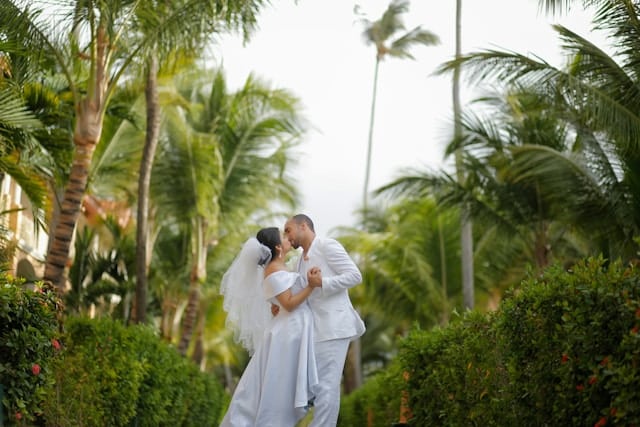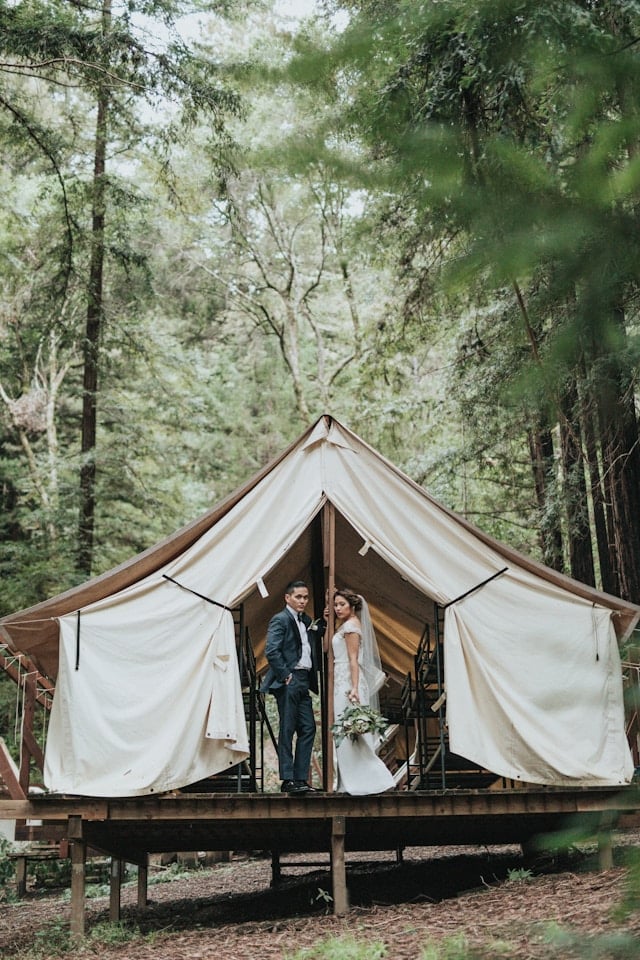Weddings are expensive! However, if you don’t plan your destination wedding the right way, it can be even more expensive – and possibly be filled with many regrets.
Anyway, I certainly don’t want to put you off of the idea, as a destination wedding can be one of the best experiences of your life!
But where to start?
In this post, we look at a step-by-step approach to planning a destination wedding, plus some extra tips and advice to help you along the way!
10 Steps to planning a destination wedding
Embarking on the journey of planning a destination wedding is an exciting adventure, but it can also be overwhelming without proper guidance. With careful preparation and attention to detail, your dream celebration in a picturesque locale can become a reality.

Step 1: Determine Your Destination Wedding Budget
When envisioning your dream destination wedding, it’s crucial to establish a realistic budget to guide your planning process.
Consider all expenses, including travel costs, venue fees, accommodations, and vendor services. Allocating funds appropriately ensures you stay within your financial means while still creating an unforgettable experience.
Here’s how to approach this crucial step:
-
Assess Your Financial Situation: Begin by evaluating your financial resources and determining how much you can comfortably allocate towards your destination wedding. Consider your savings, any contributions from family members, and whether you’ll be taking out a loan or using credit cards.
-
Research Destination Costs: Different destinations come with varying price tags, so research the cost of hosting a wedding in your desired location. Factors such as venue rental fees, vendor prices, and local taxes can significantly impact your overall expenses.
-
Factor in Travel Expenses: Don’t forget to account for travel costs, including flights, accommodations, and transportation for yourselves and your guests. Depending on the destination, these expenses can vary widely and may require careful planning to accommodate everyone’s budget.
-
Allocate Funds Wisely: Once you have a total budget in mind, allocate funds to different aspects of your destination wedding, such as venue, catering, decor, entertainment, and attire. Prioritize the elements that are most important to you and your partner, ensuring that you allocate sufficient funds to bring your vision to life.
-
Build in Contingency Funds: It’s essential to include a buffer in your budget for unexpected expenses or last-minute changes. Aim to set aside at least 10-15% of your total budget for contingencies to avoid any financial surprises along the way.
Helpful Tips for this Step…
- Research currency exchange rates if you’re planning a destination wedding in a foreign country to accurately estimate costs in your home currency.
- Consider setting up a separate bank account specifically for your wedding funds to track expenses and stay organized.
- Don’t forget to budget for pre-wedding events, such as welcome dinners or excursions, to enhance the overall guest experience.
Golden Piece of Advice: When setting your budget, remember that your wedding day is just the beginning of your journey together. Avoid overspending and prioritize investing in experiences that will create lasting memories for you and your loved ones. By carefully managing your finances, you can ensure that your destination wedding is not only beautiful but also financially responsible.
Step 2: Find Your Perfect Location
Selecting the ideal destination sets the stage for your wedding festivities. Whether you envision a tropical beach ceremony, a charming countryside affair, or a cosmopolitan city celebration, research various destinations that align with your vision, budget, and guest preferences.
Consider factors like climate, accessibility, and local attractions to narrow down your options.
Here’s how to narrow down your options and find the perfect location:
-
Reflect on Your Vision: Start by envisioning the type of setting you’ve always dreamed of for your wedding day. Whether it’s a sandy beach, a charming vineyard, a majestic mountaintop, or a bustling cityscape, let your imagination guide you in determining the atmosphere and vibe you desire.
-
Consider Accessibility: While exotic locales may seem tempting, consider the accessibility of your chosen destination for both you and your guests. Evaluate factors such as travel time, flight availability, visa requirements, and ease of transportation within the destination to ensure a smooth experience for everyone involved.
-
Research Destination Wedding Hotspots: Explore popular destination wedding locations known for their breathtaking scenery, wedding-friendly venues, and experienced vendors. From tropical paradises like Hawaii and the Caribbean to romantic European cities like Paris and Florence, there’s no shortage of stunning options to choose from.
-
Factor in Seasonal Considerations: Be mindful of the seasonal climate and weather patterns in your chosen destination, as these can impact both the ambiance of your wedding and the availability of certain amenities. Consider the pros and cons of getting married during peak tourist seasons versus off-peak times to optimize your experience and budget.
-
Consult with Local Experts: Tap into the expertise of destination wedding planners, venue coordinators, and travel agents who specialize in your chosen location. They can provide invaluable insights, recommend hidden gems, and help you navigate any logistical challenges specific to the destination.

Helpful Tips:
- Schedule a scouting trip to your desired destination before making any final decisions. This allows you to experience the location firsthand, meet with vendors, and envision your wedding day in real-time.
- Research local marriage requirements and legalities to ensure a smooth and hassle-free wedding planning process.
- Don’t overlook the cultural significance of your chosen destination. Incorporating local customs, traditions, and cuisine can add an authentic touch to your wedding celebration.
Golden Piece of Advice: When selecting your destination, prioritize authenticity and personal significance over trends or societal expectations. Choose a location that holds sentimental value for you and your partner, whether it’s where you shared your first vacation together or a place that resonates with your shared interests and passions. By following your heart, you’ll create a wedding experience that truly reflects your love story and leaves a lasting impression on both you and your guests.
Step 3: Collaborate with Venue Coordinators or Hire a Local Wedding Planner
Navigating the intricacies of planning a wedding from afar can be challenging. Consider partnering with venue coordinators or hiring a local wedding planner who possesses in-depth knowledge of the destination.
Their expertise can streamline the planning process, offer valuable insights, and ensure every detail is executed flawlessly.
Here’s how to effectively collaborate with these professionals:
-
Research Venue Coordinators and Wedding Planners: Begin by researching reputable venue coordinators and wedding planners in your chosen destination. Look for professionals with extensive experience, positive reviews, and a strong track record of executing successful destination weddings.
-
Schedule Consultations: Reach out to potential venue coordinators or wedding planners to schedule initial consultations. Use this opportunity to discuss your vision, budget, and specific requirements for your destination wedding. Ask questions about their services, pricing, and availability to gauge compatibility and determine if they’re the right fit for your needs.
-
Communicate Your Vision: Clearly communicate your vision for the wedding day, including your preferred aesthetic, theme, and any cultural or religious customs you wish to incorporate. Provide inspiration photos, color palettes, and examples of elements you love to help convey your vision effectively.
-
Leverage Their Expertise: Tap into the local knowledge and expertise of venue coordinators or wedding planners to make informed decisions about vendors, logistics, and venue options. They can offer valuable insights into local customs, traditions, and regulations that may impact your wedding planning process.
-
Establish Open Communication: Maintain open and frequent communication with your chosen venue coordinator or wedding planner throughout the planning process. Utilize digital communication tools, such as email, video calls, and messaging apps, to stay connected and address any concerns or questions that arise.
Helpful Tips:
- Request references from past clients to gain insight into the experience and professionalism of potential venue coordinators or wedding planners.
- Clarify expectations regarding communication frequency, response times, and availability to ensure a smooth planning process.
- Consider hiring bilingual or multilingual professionals if language barriers exist in your chosen destination to facilitate effective communication with local vendors and suppliers.
Golden Piece of Advice: Trust in the expertise and professionalism of your chosen venue coordinator or wedding planner, but also remember to stay actively involved in the planning process. Maintain open lines of communication, provide clear direction, and collaborate closely to ensure that your vision is brought to life flawlessly. By fostering a strong partnership, you’ll navigate the complexities of planning a destination wedding with confidence and ease.
Step 4: Craft Your Guest List and Manage RSVPs
Creating a guest list tailored to your destination wedding can be a delicate balance. Consider the capacity of your chosen venue, travel logistics, and your personal preferences when finalizing your list.
Implement a streamlined RSVP process to efficiently manage responses and gather essential information from guests regarding travel plans and accommodations.

Here’s how to navigate this step effectively:
-
Create Your Initial Guest List: Begin by compiling a list of family members, close friends, and loved ones you wish to invite to your destination wedding. Consider factors such as proximity, relationship dynamics, and your budget when determining the size of your guest list.
-
Set Clear Priorities: Establish clear priorities and criteria for inviting guests to your destination wedding. Determine who must be present for your special day and who you can afford to omit from the guest list due to logistical constraints or budget limitations.
-
Communicate Early and Often: As soon as you’ve set your wedding date and chosen your destination, communicate the details to potential guests as early as possible. Provide them with essential information, such as travel dates, accommodation options, and any pre- or post-wedding events you plan to host.
-
Use Digital Tools for RSVP Management: Utilize digital RSVP tools or wedding websites to streamline the RSVP process and gather responses from your guests efficiently. Provide clear instructions and deadlines for RSVP submissions to ensure timely responses and accurate headcounts.
-
Track Responses and Follow Up: Keep track of RSVPs as they come in and follow up with guests who haven’t responded by the deadline. Maintain open lines of communication and address any questions or concerns they may have about attending your destination wedding.
Helpful Tips:
- Consider creating separate guest lists for ceremony-only attendees and those invited to additional wedding events, such as rehearsal dinners or welcome parties, to manage guest expectations and logistics effectively.
- Factor in potential declines when estimating your final guest count to avoid overbooking accommodations and exceeding venue capacity.
- Encourage guests to RSVP early by offering incentives, such as discounted room rates or exclusive perks for those who confirm their attendance promptly.
Golden Piece of Advice: Be flexible and understanding when managing your guest list and RSVPs for a destination wedding. Recognize that not all invited guests may be able to attend due to travel constraints, financial considerations, or other commitments. Focus on celebrating with those who can join you on your special day, and cherish the meaningful connections and memories you’ll create together in your chosen destination.
Step 5: Send Out Invitations
Once your guest list is finalized, design and send out invitations that reflect the style and theme of your destination wedding.
Provide detailed information about travel arrangements, accommodations, and local attractions to help guests plan their trip effectively. Consider digital RSVP options to simplify communication and reduce paper waste.
Here’s how to handle this step with care and attention to detail:
-
Design Invitations Reflecting Your Theme: Choose invitation designs that reflect the theme, color scheme, and overall aesthetic of your destination wedding. Whether you opt for elegant and formal or playful and whimsical, ensure that your invitations convey the atmosphere and vibe of your special day.
-
Include Essential Information: Provide guests with all the essential details they need to plan their trip and participate in your wedding festivities. This includes the date, time, and location of the ceremony and reception, as well as travel and accommodation information, dress code, and RSVP instructions.
-
Communicate Travel Logistics: Outline travel logistics clearly in your invitations to help guests navigate the journey to your destination. Include information about nearby airports, transportation options, recommended accommodations, and any special arrangements or group rates you’ve secured for your guests.
-
Encourage Early RSVPs: Encourage guests to RSVP promptly by setting a clear deadline and providing convenient methods for response, such as online RSVP forms or pre-addressed reply cards. Stress the importance of timely responses to facilitate accurate planning and ensure a seamless experience for everyone involved.
-
Personalize Invitations for VIP Guests: Consider personalizing invitations for VIP guests, such as immediate family members, bridal party members, or close friends, to add a special touch and express your appreciation for their presence on your wedding day.

Helpful Tips:
- Send out save-the-date cards well in advance of your wedding invitations to give guests ample time to plan and make travel arrangements.
- Consider using electronic invitations or a combination of digital and physical invitations to minimize costs and environmental impact.
- Proofread your invitations carefully to ensure accuracy and clarity, especially when including travel and accommodation details.
Golden Piece of Advice: Your wedding invitations serve as the first glimpse of your destination wedding experience for your guests, so invest time and effort in creating invitations that are both informative and visually appealing. By providing clear and comprehensive information and conveying the excitement of your upcoming celebration, you’ll set the stage for a memorable and joyous gathering of loved ones in your chosen destination.
Step 6: Select Wedding Suppliers
Research and select reputable wedding suppliers at your destination, including photographers, caterers, florists, and entertainment services.
Request quotes, review portfolios, and schedule consultations to ensure they align with your vision and budget. Communicate clearly with vendors regarding logistics, timelines, and any specific requirements for your destination wedding.
Here’s how to navigate this step with confidence:
-
Research Local Vendors: Begin by researching local wedding vendors in your chosen destination, including photographers, caterers, florists, musicians, and other essential suppliers. Explore online reviews, portfolios, and recommendations from trusted sources to identify reputable professionals with a proven track record of excellence.
-
Review Portfolios and Samples: Take the time to review the portfolios, sample work, and past projects of potential wedding suppliers to assess their style, quality, and suitability for your wedding vision. Look for consistency, creativity, and attention to detail in their work to ensure a seamless fit with your aesthetic preferences.
-
Request Quotes and Proposals: Reach out to your shortlisted wedding suppliers to request quotes, proposals, and additional information about their services. Be clear about your budget, timeline, and specific requirements to receive accurate and customized proposals tailored to your needs.
-
Schedule Consultations: Schedule consultations or virtual meetings with potential wedding suppliers to discuss your vision, preferences, and any unique considerations for your destination wedding. Use this opportunity to ask questions, share inspiration, and gauge their professionalism, responsiveness, and rapport.
-
Check References and Credentials: Request references from past clients and review testimonials or online reviews to verify the reliability and reputation of potential wedding suppliers. Ensure that they possess the necessary licenses, permits, and insurance coverage required to operate legally in your chosen destination.
Helpful Tips:
- Consider hiring a destination wedding planner who can recommend trusted local vendors and coordinate logistics on your behalf, saving you time and stress.
- Prioritize booking essential vendors, such as your venue, photographer, and caterer, as early as possible to secure your preferred dates and ensure availability.
- Negotiate contracts carefully and review terms and conditions, payment schedules, and cancellation policies to protect your interests and avoid any misunderstandings or disputes.
Golden Piece of Advice: When selecting wedding suppliers for your destination wedding, prioritize professionalism, reliability, and compatibility with your vision and values. Trust your instincts and choose vendors who not only demonstrate talent and expertise but also understand your unique vision and are committed to bringing it to life flawlessly. By building a trusted team of suppliers who share your passion and dedication, you’ll create a truly unforgettable destination wedding experience for you and your guests.
Step 7: Ensure Legal Compliance
Destination weddings often involve navigating legal requirements and documentation specific to the location. Research marriage license procedures, residency requirements, and any cultural or religious customs that may impact your ceremony.
Allow ample time to complete necessary paperwork and obtain any required permits or permissions.
Here’s how to handle this step effectively:
-
Research Marriage Laws: Start by researching the marriage laws and requirements specific to your chosen destination. Understand the legal process for obtaining a marriage license, any residency requirements, and any additional documentation or permits you may need to secure before your wedding day.
-
Consult with Legal Experts: Seek guidance from legal experts, such as destination wedding planners, local authorities, or legal advisors familiar with the marriage laws of your chosen destination. Clarify any questions or concerns you may have regarding marriage legality, cultural customs, or legal implications for international couples.
-
Gather Necessary Documentation: Compile all necessary documentation required to obtain a marriage license in your chosen destination. This may include passports, birth certificates, divorce decrees, death certificates (if applicable), and any additional paperwork specified by local authorities.
-
Plan Ahead for Processing Times: Be mindful of processing times and deadlines for obtaining marriage licenses or completing legal paperwork in your destination. Allow ample time to gather and submit required documents, especially if you’re planning a destination wedding in a foreign country with different bureaucratic procedures.
-
Follow Legal Procedures: Adhere to all legal procedures and requirements outlined by local authorities to ensure that your marriage is legally recognized and valid. Work closely with your venue coordinator, wedding planner, or legal advisor to navigate any cultural or language barriers and facilitate a smooth process.
Helpful Tips:
- Consider hiring a local attorney or legal representative familiar with marriage laws in your chosen destination to guide you through the legal process and ensure compliance with all legal requirements.
- Obtain certified translations of any documents not in the official language of your destination to facilitate communication with local authorities and streamline the documentation process.
- Research whether your destination recognizes marriages performed abroad and whether additional steps are necessary to register your marriage upon your return home.

Golden Piece of Advice: Prioritize legal compliance and thorough preparation when navigating the legal requirements for your destination wedding. By understanding and fulfilling all necessary legal obligations, you can ensure that your marriage is legally recognized and valid, providing peace of mind and laying the foundation for a lifetime of love and commitment in your chosen destination.
Step 8: Arrange Accommodations
Secure accommodations for yourselves and your guests well in advance to ensure availability and preferred rates.
Explore options ranging from luxury resorts and boutique hotels to vacation rentals and guesthouses. Negotiate group rates or room blocks to accommodate varying budgets and preferences while fostering a sense of community among your guests.
Here’s how to navigate this step with ease:
-
Research Accommodation Options: Begin by researching accommodation options in your chosen destination, ranging from hotels and resorts to vacation rentals and guesthouses. Consider factors such as proximity to your wedding venue, amenities, pricing, and availability for your desired dates.
-
Negotiate Group Rates or Room Blocks: Reach out to hotels or resorts to inquire about group rates or room blocks for your wedding guests. Negotiate favorable terms, such as discounted rates, complimentary upgrades, or exclusive perks, to accommodate varying budgets and preferences while fostering a sense of unity among your guests.
-
Consider Alternative Accommodation: Explore alternative accommodation options, such as Airbnb rentals, vacation homes, or boutique hotels, for a more personalized and intimate experience. Ensure that these accommodations meet your criteria for comfort, location, and suitability for your wedding festivities.
-
Communicate Accommodation Details: Clearly communicate accommodation details to your guests, including booking instructions, reservation deadlines, and any special arrangements or discounts you’ve secured. Provide comprehensive information about each accommodation option, including amenities, proximity to the wedding venue, and transportation options.
-
Facilitate Booking Process: Streamline the booking process for your guests by providing convenient booking channels, such as personalized booking links or group reservation codes, to simplify the reservation process. Offer assistance and support to guests who may require additional guidance or accommodation preferences.
Helpful Tips:
- Reserve accommodations for yourselves and your immediate family members well in advance to secure preferred dates and room configurations.
- Consider hosting a welcome reception or gathering at the chosen accommodations to kick off your destination wedding festivities and foster a sense of community among your guests.
- Provide guests with a range of accommodation options to accommodate different preferences and budgets, including nearby alternatives for those who prefer to stay off-site.
Golden Piece of Advice: Prioritize convenience, comfort, and accessibility when selecting accommodations for your destination wedding guests. Choose options that align with your wedding vision and offer flexibility, affordability, and personalized touches to enhance the overall guest experience. By facilitating seamless booking and providing ample support, you’ll ensure that your guests feel welcomed and appreciated as they celebrate your special day in your chosen destination.
Step 9: Plan Wedding Logistics
Coordinate transportation logistics for yourselves and your guests, including airport transfers, shuttle services, and transportation to and from the venue.
Create a detailed timeline outlining the flow of events, from pre-wedding activities to the ceremony and reception. Anticipate potential challenges and have contingency plans in place to mitigate any unforeseen circumstances.

Here’s how to manage this step effectively:
-
Create a Detailed Timeline: Develop a comprehensive timeline outlining key events and activities leading up to and including your wedding day. Include important milestones such as vendor meetings, rehearsal dinners, ceremony start times, and reception schedules to keep everyone informed and organized.
-
Coordinate Transportation: Arrange transportation logistics for yourselves, your wedding party, and guests, including airport transfers, shuttle services, and transportation to and from the venue. Ensure that transportation arrangements are reliable, efficient, and tailored to accommodate the needs of all participants.
-
Organize Vendor Logistics: Communicate with your vendors to coordinate logistics, including delivery schedules, setup and breakdown times, and any special requirements for equipment or supplies. Confirm details such as venue access, parking arrangements, and vendor meals to minimize potential disruptions on your wedding day.
-
Manage Guest Itineraries: Provide guests with detailed itineraries or schedules outlining the timing and locations of wedding events, as well as any optional activities or excursions they may wish to participate in. Include information about transportation options, dress codes, and recommended attire to ensure that guests are well-prepared and informed.
-
Prepare for Contingencies: Anticipate potential challenges or unexpected scenarios that may arise during your destination wedding and develop contingency plans to address them proactively. Be flexible and adaptable in your approach, remaining calm and resourceful in the face of any unforeseen circumstances.
Helpful Tips:
- Delegate specific tasks and responsibilities to trusted members of your wedding party or family members to help distribute the workload and ensure that all logistical details are attended to.
- Schedule a final walkthrough of the venue and review logistics with your wedding planner or coordinator to confirm that everything is in place and running according to plan.
- Communicate regularly with your vendors, venue staff, and other key stakeholders to address any last-minute changes or concerns and maintain open lines of communication throughout the planning process.
Golden Piece of Advice: Embrace the spirit of adventure and spontaneity that comes with planning a destination wedding, but also prioritize meticulous planning and attention to detail to ensure a flawless execution. By carefully coordinating logistics, communicating effectively with all parties involved, and remaining flexible in the face of challenges, you’ll create a memorable and stress-free wedding experience for yourself and your guests in your chosen destination.
Step 10: Execute Final Details
As your wedding day approaches, finalize all remaining details to ensure a smooth and stress-free experience. Conduct a thorough review of your checklist, confirm vendor arrangements, and communicate any last-minute updates to your wedding party and guests.
Embrace the excitement of your destination wedding and cherish the moments that unfold in this unforgettable setting.
Here’s how to manage this crucial step:
-
Review Your Checklist: Take stock of your wedding checklist and ensure that all tasks have been completed or are in progress. Double-check every detail, from vendor contracts and guest accommodations to ceremony logistics and reception arrangements, to avoid any oversights or last-minute surprises.
-
Confirm Vendor Arrangements: Reach out to your vendors to confirm final arrangements, including delivery times, setup requirements, and any outstanding payments. Provide them with updated timelines and contact information to ensure seamless communication and coordination on your wedding day.
-
Finalize Seating and Layouts: Arrange seating charts, table assignments, and venue layouts to accommodate your guests comfortably and create a cohesive flow throughout your ceremony and reception spaces. Consider factors such as guest preferences, relationships, and accessibility when finalizing seating arrangements.
-
Coordinate with Wedding Party: Touch base with your wedding party to ensure that everyone is aware of their roles and responsibilities on the wedding day. Confirm attire, hair and makeup appointments, and any special tasks or duties assigned to members of your bridal party or groomsmen.
-
Prepare Emergency Kit: Assemble an emergency kit containing essential items and supplies to address any unforeseen mishaps or emergencies that may arise on your wedding day. Include items such as safety pins, stain remover, band-aids, tissues, and a sewing kit to handle any last-minute emergencies with ease.
Helpful Tips:
- Designate a trusted friend or family member to serve as a point of contact for vendors and handle any day-of emergencies or inquiries, allowing you to focus on enjoying your wedding day.
- Delegate tasks and responsibilities to your wedding party or trusted individuals to alleviate stress and ensure that all final details are attended to.
- Take some time for self-care and relaxation in the days leading up to your wedding to ensure that you feel rested, refreshed, and ready to fully embrace your special day.
Golden Piece of Advice: Trust in the planning process and the efforts you’ve put into orchestrating your destination wedding, but also embrace the unexpected and be prepared to go with the flow. Remember that the most important thing is celebrating your love and commitment surrounded by your nearest and dearest, so savor every moment and cherish the memories you create together on this magical day in your chosen destination.

Frequently Asked Questions (FAQs) for Planning a Destination Wedding
How far in advance should we start planning our destination wedding?
Ideally, you should start planning your destination wedding at least 12 to 18 months in advance. This allows ample time to research destinations, secure venues, and coordinate logistics, especially if you're planning a wedding abroad.
How do we choose the perfect destination for our wedding?
Consider factors such as your budget, travel preferences, and desired wedding atmosphere when choosing a destination. Research various locations, evaluate their suitability for weddings, and consider factors such as climate, accessibility, and local attractions.
Do we need to hire a wedding planner for our destination wedding?
While hiring a wedding planner is optional, it can greatly simplify the planning process, especially for destination weddings. A local wedding planner can provide invaluable expertise, recommend trusted vendors, and handle logistical details, allowing you to enjoy a stress-free wedding experience.
How can we ensure that our guests have a memorable experience at our destination wedding?
Provide guests with detailed information about travel and accommodations, organize group activities or excursions, and incorporate local customs or traditions into your wedding festivities. Consider hosting welcome receptions or farewell brunches to foster a sense of community and ensure that guests feel welcomed and appreciated.
What are the legal requirements for getting married in a different country?
Legal requirements vary depending on the destination country. Research marriage laws and requirements, including marriage license procedures, residency requirements, and any documentation or permits needed. Consider consulting with legal experts or destination wedding planners for guidance.
How can we stick to our budget when planning a destination wedding?
Establish a realistic budget early in the planning process and prioritize expenses based on your wedding vision. Research destination costs, negotiate vendor contracts, and consider alternative accommodation options to stay within your budget. Be mindful of currency exchange rates and additional fees when budgeting for a destination wedding.
What should we consider when sending out invitations for our destination wedding?
Include essential information such as the wedding date, location, travel and accommodation details, and RSVP instructions in your invitations. Provide guests with ample time to plan their trip, and consider digital RSVP options to streamline the response process. Personalize invitations to reflect the style and theme of your destination wedding.
How can we ensure that our wedding day runs smoothly?
Plan ahead, communicate effectively with vendors and guests, and delegate tasks to trusted individuals or your wedding party. Create a detailed timeline, prepare for contingencies, and trust in the expertise of your wedding planner or coordinator. Relax, enjoy the moment, and focus on celebrating your love surrounded by loved ones.
What should we pack for our destination wedding?
Pack essential items such as wedding attire, travel documents, personal belongings, and any special items or decorations for the wedding. Consider the climate and activities planned for your destination and pack accordingly. Don't forget to pack your emergency kit with essential supplies for any unforeseen mishaps.
How can we make our destination wedding unique and memorable?
Personalize your wedding with meaningful touches, incorporate elements of the destination's culture or scenery into your decor and festivities, and prioritize experiences that reflect your interests and personalities as a couple. Embrace the adventure of planning a destination wedding and create cherished memories that will last a lifetime.
Planning a destination wedding is a labor of love that requires meticulous attention to detail, careful coordination, and thoughtful consideration of your guests’ needs.
By following these steps and leveraging the expertise of local professionals, you can orchestrate a magical celebration that reflects your unique love story amidst the breathtaking backdrop of your chosen destination.

by Tanya Guilfoyle
Born in Johannesburg, South Africa, Tanya has been an active contributor and planner in the wedding industry since 2016. When not writing useful content for brides and wedding professionals, she can be found designing templates for her Etsy shop, TWCprintables.



